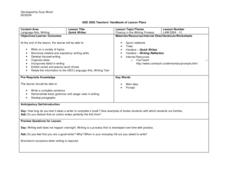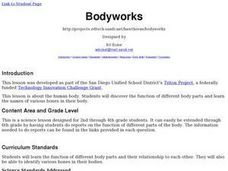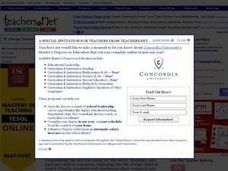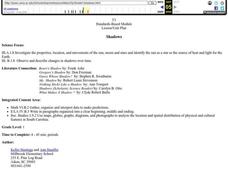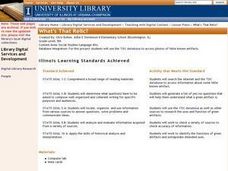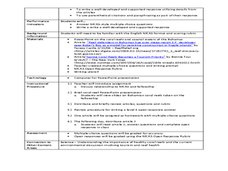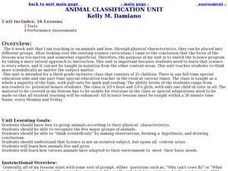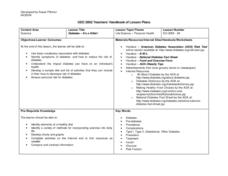Curated OER
Exploring Literature And Weather Through Chirps
Students explore using crickets' chirps to calculate temperature. They read "Cricket in Times Square" and "The Quiet Cricket," read and discuss a Cricket eBook, develop a formula and calculate temperature using cricket chirps, and graph...
Curated OER
Science vs. Science Fiction
Students acknowledge the difference between science and science fiction through a compare/contrast activity. They discuss their reading materials together. Students identify characteristics specific to science fiction.
Curated OER
Analyzing Advertising
Learners critically examine advertising. They investigate how to become wiser consumers. They explore the topic of advertising more deeply by using the reports called "Web of Deception" and "Selling America's Kids: Commercial Pressures...
Curated OER
Deck of Word Cards
Students study vocabulary words associated with indoor air quality. In this air quality lesson plan, students participate in a word card game where they write sentences for the vocabulary words given. Students then check the original...
Curated OER
Evaporation in the Water Cycle
Students study the stages of the water cycle and evaporation. In this water cycle lesson, students read Water Cycles and color a diagram of the water cycle. Students review related terms and sing a song about the Water Cycle. Students...
Curated OER
Quick Writes
High schoolers write on a variety of topics, maximize creative and expository writing skills, develop focused writing, organize ideas, incorporate detail in writing, and exhibit varied and precise word choice.
Curated OER
Utilizing Community Resources
Students gain an understanding of scientific methods and use process skills (such as observing, classifying, and predicting) to solve a problem. They develop an understanding of the need for natural preservation.
Curated OER
The Horrible No Good Very Bad Day
First graders read Alexander and the Terrible Horrible No Good Very Bad Day, write sentence or paragraph about their experience with a bad day, and combine their work with that of classmates to create class book.
Curated OER
Bodyworks
Students study about the different parts of their body and the names of bones as well. They gain an understanding of the function about the parts. Students follow along as the teacher guides them and points out various parts and their...
Curated OER
Teaching Night with Web Research Assignments
Young scholars research the Holocaust. They read the autobiography, Night, by Elie Wiesel, conduct research on a child of the Holocaust, and write an essay comparing/contrasting the life of their selected child with that of Elie Wiesel.
Curated OER
Shadows
First graders measure how a shadow changes over the course of a day. They write about what they would do if they lost their shadow, and make silhouettes of themselves. Students make up a shadow dance and read stories about shadows.
Curated OER
Lesson Plan
Eleventh graders will read, write, listen, and speak for information and understanding Key Idea: As listeners and readers, 11th graders will collect data, facts, and ideas, discover relationships, concepts, and generalizations. As...
Curated OER
What's That Relic?
Fifth graders listen to a read aloud of David Mc Cauley's book Motel of the Mysteries. They discuss an unknown artifact and decide what it might be used for. They research other artifacts and play "What's that Relic?"
Curated OER
Creepy Crawlies
Second graders study the world of insects. They join Greenpatch Kids, an organization of young people who are interested in nature and want to protect our environment. In addition, the students assess use of technology as a valuable...
Curated OER
Bahamian Coral Reef Development
Students study tourism and conservation. In this coral development lesson students view a PowerPoint presentation and write a report.
Curated OER
Animal Classification Unit
Third graders study how to group animals by their physical characteristics. They examine how animals have adapted to have their needs met by the environment.
Curated OER
Edible Math
Second graders use M&M candies to graph colors, illustrate story problems and practice hands-on math. They use spreadsheets, worksheets and graphs to organize math problems that use M&M's.
Curated OER
Diabetes - It's a Killer!
Students survey, graph and chart their prior knowledge about diabetes. They read a handout and complete a K-W-L chart. They develop a rubric to assess their diet and exercise and develop a shopping list, menu and exercise plan to share.
Alabama Learning Exchange
Air is All Around You
Pupils investigate the mysteries of air. In this science instructional activity, young scholars participate in hands-on activities that require them to use the scientific inquiry model to study air.
Curated OER
Life During the Industrial Revolution
Seventh graders present information about the Industrial Revolution. In this Industrial Revolution lesson, 7th graders work in groups research inventions and prepare an information poster for the invention. Students present their poster.
Curated OER
Ancient Greece Research
Sixth graders explore ancient Greece. For this ancient civilizations lesson, 6th graders research how ancient Greece influenced modern societies. Students prepare PowerPoint presentations to share their findings with their classmates.
Curated OER
Dots
Students read the story "Ten Black Dots." They brainstorm what you can do with dots. Students create a picture and a story with ten dots. They discuss how a computer uses dots. Additional ideas are listed for cross curriculum.
Curated OER
Assessing Health Habits
Seventh graders discuss what are the characteristics of a personal with good health. They read an article about influences on health and discuss and perform a self assessment to gauge their personal health. They then go to the gym and...
Curated OER
Hero Or Zero?
Students investigate science and technology by reading a children's book. In this reading comprehension lesson, students read the story Archibald Frisby and discuss the ways we use science and technology in everyday life....







